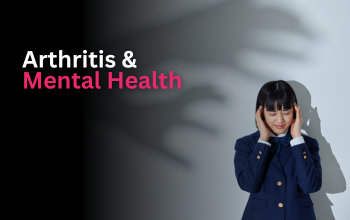The Arthritis Newsletter
Winter 2016Will I Ever Feel Better Again? Arthritis and Depression
By Gerry Sheanh
 Without getting hung up on trying to figure out how rheumatoid arthritis is linked to clinical depression, it is enough to know that those with rheumatoid arthritis often battle depression. And we’re not talking about moderate bouts of sadness, but prolonged episodes of deep depression that render the person immobile, pessimistic, hopeless, helpless and overwhelmed. With the added issues brought on by a systemic arthritic condition, the depressed person can feel a sense of diminishing capacity that they are convinced can and will only get worse. There is no doubt that depression poses a serious threat to the well-being of an arthritis patient, but we need a sound understanding of what depression looks and feels like.
Without getting hung up on trying to figure out how rheumatoid arthritis is linked to clinical depression, it is enough to know that those with rheumatoid arthritis often battle depression. And we’re not talking about moderate bouts of sadness, but prolonged episodes of deep depression that render the person immobile, pessimistic, hopeless, helpless and overwhelmed. With the added issues brought on by a systemic arthritic condition, the depressed person can feel a sense of diminishing capacity that they are convinced can and will only get worse. There is no doubt that depression poses a serious threat to the well-being of an arthritis patient, but we need a sound understanding of what depression looks and feels like.
Beyond a pervasive sadness, severely depressed people experience a loss of interest and loss of pleasure from those activities they normally enjoy. There can be a change in appetite, with some avoiding food while others increase their intake. There can be a withdrawal from contact with friends and family, and also from co-workers. There are overwhelming feelings of helplessness and hopelessness and major issues with fatigue and sleep disruption. On top of all of these life-sapping factors, depression is closely associated with, and some say defined by, defective thinking about yourself and your situation, meaning that your thought processes have devolved to the point that they are no longer helpful to your sense of well-being. So, what to do?
The elements of an effective treatment plan for clinical depression primarily consist of attending to mind and body. There are numerous anti-depressant medications that may vary in how they approach the problem, and it may take trying different medications, with careful monitoring by a doctor, before one is found to be helpful. Remember that anti-depressants aren’t happy pills; they are often complex medications designed to work on brain chemistry. Antidepressant medications can be a great help, particularly when used alongside cognitive behavioural therapy (CBT).
Often employed by trained counsellors, CBT rests on the assumption that we are who and what we think we are. In other words, we make sense of our world by assigning certain thoughts to things. When we become depressed, our thinking often becomes negative and our assumptions about our world become unhelpful to us. CBT seeks to help the patient examine their thoughts and reframe them into more positive ones. Used along with appropriate medication, CBT is often successful in reversing the downward spiral of depression.
While appropriate medication and CBT will help attend to the mind-related aspects of depression, it is vital to pay attention to the physical nurturing your depressed body requires. If all you can reasonably do is walk each day, then do that out in the open air where oxygen will fill your lungs and where your blood flow will be stimulated. Gradually, as you begin to feel better, you may have more success in recalibrating your food intake and your sleep patterns.
Emerging from the black hole of clinical depression isn’t easy or quick. It takes a long time to become severely depressed, and it will take a long time to climb back. With medication, CBT, exercise and restored appetite and sleep routines the road to recovery is possible. Above all, feeling better is a process, not an event.




















































